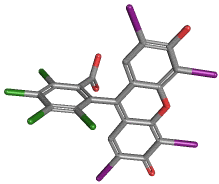|
ROSE BENGAL DISODIUM |
| Synonyms. Rose Bengal disodium salt; 2,4,5,7-Tetraido(m,p,o',m')tetrachlorofluorescein, disodium salt; Disodium 3,4,5,6-tetrachloro-2-(2,4,5,7-tetraiodo-6-oxido-3-oxoxanthen-9-yl)benzoate; 4,5,6,7-Tetrachloro-3',6'-dihydroxy-2',4',5',7'-tetraiodo- spiro(isobenzofuran-1(3H),9'-(9H)xanthen)-3-one disodium salt; 4,5,6,7-Tetrachloro-2',4',5',7'-tetraiodofluorescein disodium salt; Food Red Color No. 105 sodium salt; Xantryl; 9-(3',4',5',6'-Tetrachloro-o-carboxyphenyl)-6-hydroxy- 2,4,5,7-tetraiodo-3- isoxanthone 2Na; C.I. Acid Red 94; |
|
|
| PRODUCT IDENTIFICATION | |
|
CAS RN |
632-69-9 |
|
EINECS RN |
211-183-3 |
|
FORMULA |
C20H2Cl4I4Na2O5 |
|
MOLE WEIGHT |
1017.64 |
|
H.S CODE |
3204.12.4500 |
|
SMILES |
[Na+].[Na+].C12(OC(=O)c3c2c(c(c(c3Cl)Cl)Cl)Cl)c2cc(I)c([O-])c(c2Oc2 c(c (c(cc12)I)[O-])I)I |
|
CLASSIFICATION |
Triarylmethane, Coloring Agent, Indicator, Luminescent Agent |
|
EXTRA NOTES |
A bright bluish pink compound that has been used as a dye, biological stain, and diagnostic aid. |
|
|
| PHYSICAL AND CHEMICAL PROPERTIES | |
|
PHYSICAL STATE. |
red to brown powder |
|
MELTING POINT |
|
|
BOILING POINT |
|
|
DENSITY |
|
|
SOLUBILITY IN WATER |
|
| SOLVENT SOLUBILITY |
|
|
VAPOR DENSITY |
|
|
log P(octanol-water) |
|
|
VAPOR PRESSURE |
|
|
AUTOIGNITION TEMP |
|
| pK |
|
|
REFRACTIVE INDEX |
|
|
FLASH POINT |
|
|
|
| STABILITY AND REACTIVITY | |
| STABILITY | Stable under normal conditions. |
|
INCOMPATIBLE MATERIALS |
Strong oxidizing agents |
| POLYMERIZATION |
Has not been reported |
|
NFPA RATINGS |
Health: 0, Flammability: 0, Reactivity: 0 |
|
|
| EXTERNAL LINKS & GENERAL DESCRIPTION |
|
USA.gov - Rose Bengal Wikipedia Linking - Rose Bengal Google Scholar Search - Rose Bengal Drug Information Portal (U.S. National Library of Medicine) - Rose Bengal PubChem Compound Summary - Rose Bengal KEGG (Kyoto Encyclopedia of Genes and Genomes) - Rose Bengal http://www.ebi.ac.uk/chebi/ - Rose Bengal http://www.ncbi.nlm.nih.gov/ - Rose Bengal Material Safety Data Sheet - Rose Bengal Hazardous Substances Data Bank - Rose Bengal EPA - Substance Registry Services - Rose Bengal |
|
|
| SALES SPECIFICATION | |
|
APPEARANCE |
red to brown powder |
|
DYE CONTENT |
80% min |
|
LOSS ON DRYING |
10% max |
|
|
| TRANSPORT & REGULATORY INFORMATION | |
|
UN NO. |
|
| HAZARD CLASS |
|
| PACKING GROUP | |
|
|
| SAFETY INFORMATION | |
|
HAZARD OVERVIEW |
Not a dangerous substance or mixture according to GHS (Globally Harmonised System). Eyes: May cause eye irritation. Skin: May be harmful if absorbed through skin. May cause skin irritation. Inhalation: May be harmful if inhaled. May cause respiratory tract irritation. Ingestion: May be harmful if swallowed. |
| HAZARD CODES |
|
|
RISK PHRASES |
|
|
SAFETY PHRASES |
|
|
|
| PACKING |
|
Preserve in light-resistant and well-closed containers |
